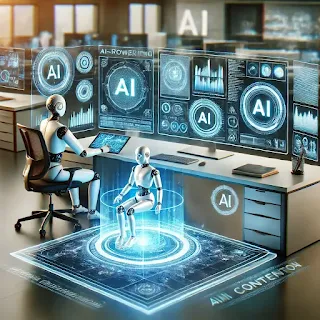AI-Powered Content Creation: Opportunities and Challenges
Introduction
Artificial Intelligence (AI) is revolutionizing multiple industries, including content creation. AI-driven tools can generate blog posts, news articles, graphics, and even videos within minutes. While these tools offer efficiency, they also bring challenges such as originality concerns, ethical dilemmas, and their impact on human creativity.
In this article, we will explore how AI is shaping content creation, its advantages, and the challenges it presents.
How AI Creates Content?
AI can generate content using advanced machine learning models trained on vast amounts of data. The most common applications include:
1. AI-Generated Writing
AI-powered tools like ChatGPT, Jasper AI, and Copy.ai can write blog posts, marketing content, and social media captions. These tools analyze existing data and generate human-like text, helping businesses automate content production.
2. AI in Graphic Design
AI-based platforms like DALL·E, Midjourney, and Canva AI assist in designing logos, social media posts, and digital artwork. Users simply provide a prompt, and AI generates visually appealing graphics.
3. AI-Generated Videos and Animation
Video creation tools like Runway ML and Synthesia use AI to automate editing, voice-overs, and animation, making video production more efficient.
4. AI in Audio Content
Text-to-speech (TTS) platforms like Descript and ElevenLabs can convert written text into human-like audio, making podcasts and audiobooks more accessible.
Advantages of AI in Content Creation
1. Faster Content Production
AI can generate thousands of words within seconds, significantly reducing the time required for content creation.
2. Cost Efficiency
Hiring writers, designers, and video editors can be expensive. AI-powered tools reduce these costs by automating tasks.
3. Multilingual Content Creation
AI translation tools help businesses create content in multiple languages, allowing them to reach a global audience.
4. Improved Personalization
AI analyzes user data and creates personalized content, enhancing user engagement. For instance, Netflix and YouTube use AI to recommend personalized videos based on viewing history.
5. Consistency in Branding
AI-generated content ensures brand consistency by following pre-defined styles and guidelines.
Challenges of AI-Powered Content Creation
1. Lack of Originality
AI relies on pre-existing data to generate content, making it difficult to create truly original or innovative ideas.
2. Ethical and Legal Issues
There are debates regarding the ownership of AI-generated content. Who holds the copyright—the AI tool’s developer or the user?
3. Potential Misinformation
AI models sometimes generate inaccurate or misleading content, especially when dealing with news or sensitive topics.
4. Job Displacement Concerns
As AI automates writing, designing, and video production, many professionals fear job losses in the creative industry.
5. AI’s Dependence on Human Oversight
AI-generated content still requires human supervision to ensure quality, accuracy, and ethical considerations.
How Can AI and Human Creativity Coexist?
Instead of replacing human creators, AI should be seen as a tool that enhances creativity. Here’s how AI and human creativity can work together:
- AI as an Assistant, Not a Replacement – Writers and designers can use AI to generate ideas, but human refinement is essential for originality.
- Human Oversight for Accuracy – Editors should fact-check AI-generated content before publishing.
- Ethical Use of AI – Companies must establish guidelines on how AI-generated content is used to ensure fairness and transparency.
Future of AI in Content Creation
AI’s role in content creation is expanding. Future advancements may include:
- More Human-Like AI Writers – Future AI models will better understand emotions and tone.
- AI-Generated Movies and Music – AI is already composing music and assisting in filmmaking.
- Smarter AI Assistants – AI will provide real-time content recommendations for creators.
While AI is a powerful tool, human creativity remains irreplaceable. The ideal future is one where AI enhances human potential rather than replacing it.
Conclusion
AI-powered content creation is transforming the digital landscape, offering speed, efficiency, and personalization. However, challenges like originality, ethical concerns, and misinformation cannot be ignored. The key to success is balancing AI automation with human creativity to produce high-quality and engaging content.








0 Comments